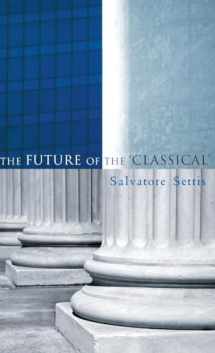
The Future of the Classical
ISBN-13:
9780745635989
ISBN-10:
0745635989
Edition:
1
Author:
Salvatore Settis, Allan Cameron
Publication date:
2006
Publisher:
Polity
Format:
Hardcover
104 pages
Category:
Ancient Civilizations History
,
World History
,
History & Surveys
,
Philosophy
FREE US shipping
Book details
ISBN-13:
9780745635989
ISBN-10:
0745635989
Edition:
1
Author:
Salvatore Settis, Allan Cameron
Publication date:
2006
Publisher:
Polity
Format:
Hardcover
104 pages
Category:
Ancient Civilizations History
,
World History
,
History & Surveys
,
Philosophy
Summary
The Future of the Classical (ISBN-13: 9780745635989 and ISBN-10: 0745635989), written by authors
Salvatore Settis, Allan Cameron, was published by Polity in 2006.
With an overall rating of 3.6 stars, it's a notable title among other
Ancient Civilizations History
(World History, History & Surveys, Philosophy) books. You can easily purchase or rent The Future of the Classical (Hardcover) from BooksRun,
along with many other new and used
Ancient Civilizations History
books
and textbooks.
And, if you're looking to sell your copy, our current buyback offer is $0.3.
Description
Every era has invented a different idea of the 'classical' tocreate its own identity. Thus the 'classical' does not concern onlythe past: it is also concerned with the present and a vision of thefuture. In this elegant new book, Salvatore Settis traces the ways in whichwe have related to our 'classical' past, starting with post-modernAmerican skyscrapers and working his way back through our culturalhistory to the attitudes of the Greeks and Romans themselves.Settis argues that this obsession with cultural decay, ruins and a'classical' past is specifically European and the product of acollective cultural trauma following the collapse of the RomanEmpire. This situation differed from that of the Aztec and Incaempires whose collapse was more sudden and more complete, and fromthe Chinese Empire which always enjoyed a high degree ofcontinuity. He demonstrates how the idea of the 'classical' haschanged over the centuries through an unrelenting decay of'classicism' and its equally unrelenting rebirth in an alteredform. In the Modern Era this emulation of the 'ancients' by the 'moderns'was accompanied by new trends: the increasing belief that theformer had now been surpassed by the latter, and an increasingpreference for the Greek over the Roman. These conflictinginterpretations were as much about the future as they were aboutthe past. No civilization can invent itself if it does not haveother societies in other times and other places to act asbenchmarks. Settis argues that we will be better equipped to mould newgenerations for the future once we understand that the 'classical'is not a dead culture we inherited and for which we can take nocredit, but something startling that has to be re-created every dayand is a powerful spur to understanding the 'other'.


We would LOVE it if you could help us and other readers by reviewing the book
Book review

Congratulations! We have received your book review.
{user}
{createdAt}
by {truncated_author}


